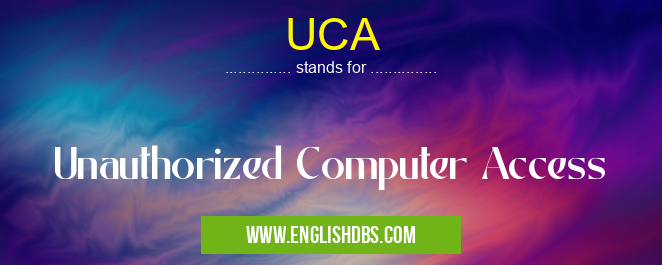What does UCA mean in CYBER & SECURITY
UCA stands for Unauthorized Computer Access. It is a breach of security where a person or entity gains access to computer systems, networks, and data without the knowledge or authorization of the owner. UCA can result in serious consequences including stolen information, data loss, identity theft, service interference, and financial fraud. This article aims to provide an overview of UCA with FAQs

UCA meaning in Cyber & Security in Computing
UCA mostly used in an acronym Cyber & Security in Category Computing that means Unauthorized Computer Access
Shorthand: UCA,
Full Form: Unauthorized Computer Access
For more information of "Unauthorized Computer Access", see the section below.
Essential Questions and Answers on Unauthorized Computer Access in "COMPUTING»SECURITY"
What are some common sources of unauthorized computer access?
Common sources of unauthorized computer access include websites that have vulnerable security measures, malware that has been spread through email attachments or downloads from untrustworthy websites, spyware programs that track keystrokes or activities on your computer, and using someone else's login credentials without authorization.
What are the risks associated with unauthorized computer access?
Risks associated with unauthorized computer access include stolen information, viruses that could damage a user's system and files, increased risk of identity theft if personal information is compromised, service disruption if services such as communications are blocked by a hacker's access attempt, and financial fraud if malicious individuals gain control of financial accounts belonging to the user.
How can users protect against unauthorized computer access?
Users can protect against unauthorized computer access by regularly updating their operating systems and applications, deleting emails and clicking links from unknown senders or companies they don't recognize as trustworthy sources, using strong passwords that are unique to each account they hold online or on their devices, installing anti-virus software and firewalls on their systems, avoiding public wi-fi networks when accessing sensitive information online and being aware of online scams such as phishing schemes.
What should you do if you suspect someone has accessed your system without permission?
If you suspect someone has accessed your system without permission you should immediately change any passwords affected by the intrusion and contact your internet provider (ISP) if necessary to report the incident. You should also contact authorities such as law enforcement if applicable depending on the type of intrusion that occurred. Additionally it is important to assess how much data may have been compromised as part of the attack so appropriate steps can be taken to prevent further damage.
What laws exist around unauthorized computer access?
Laws surrounding unauthorized computer access vary by jurisdiction but most countries have laws in place prohibiting such activities. In most cases penalties for those found guilty range from fines to jail time depending on the severity of intrusion attempted or accomplished during their activities. Most developed nations also have specific laws related to cybercrime which may include penalties for those who utilize techniques such as malware or spyware in order to gain unlawful entry into others' systems and networks.
Final Words:
Unauthorized Computer Access (UCA) is a major security concern for all individuals utilizing networks or devices connected to the internet Today there are many risks associated with this type of activity including stolen information viruses service disruption increased risk of identity theft and financial fraud Understanding these risks preventing UCA through regular updates secure passwords antivirus software reported incidents can help keep individuals safe from cybercriminals seeking illegal access
